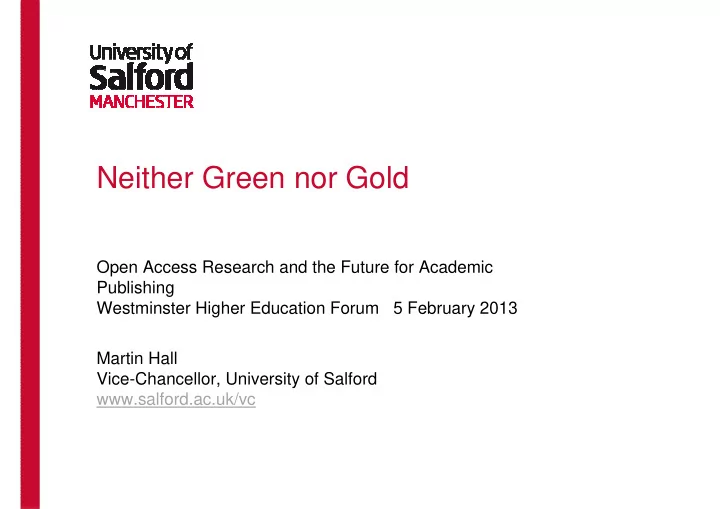

Neither Green nor Gold Open Access Research and the Future for Academic Publishing Westminster Higher Education Forum 5 February 2013 Martin Hall Vice-Chancellor, University of Salford www.salford.ac.uk/vc
•Finch Group Report: the wider context •1995+: “Information Age” or “Digital Dark Age”? •An example: from excavation to open replication •Science as an open enterprise: the Royal Society Report •The “Fourth Paradigm”: securing the semantic web
Finch Group Report: the wider context •Mostly reported and debated as “Green” versus “Gold”, publication charges and the role of commercial publishers. But our report was in a far wider context than this •Today: the connection between open access publishing, open data and the future of research, and why the copy-of-record is key “The key challenge for publishers as well as for others concerned in the effective communication of research is how to handle the increasingly complex relationships between the books, articles and other publications on the one hand, and the data that underlies the findings that those publications present on the other; and how to ensure that they are presented and made accessible in an integrated way” (Finch Group Report 2012: 3.21)
1995+: “Information Age” or “Digital Dark Age”? •Two benchmarks: * Manuel Castells’ Information Age trilogy (1996, 1997, 1998) – “global flows” of digital information will redefine the world economy; * International Federation of Library Associations and Institutions (1997) – concept of the “Digital Dark Age”. • Denmark’s Galathea expeditions of 1845, 1950 and 2006 – “only a few data collections from the third expedition can be preserved. The remaining research data are dispersed over local hard disks with little or no chance of long-term preservation. As a result, this third modern-day expedition could leave less research data behind than the two earlier ones” (Knowledge Exchange 2011).
The crisis for knowledge creation and management: A deluge of digital data, fragmented into silos with complex ownership rights and restricted interoperability: • In 2012, total global digital information was 2.7 zetabytes, a 48% increase from 2011. By 2020, 35 zetabytes of new digital data will be created each year (1 zetabyte = 1 billion terabytes) •Medicine: two new peer-reviewed papers published each minute - “Each newly published paper is thus now cast adrift and essentially lost at sea” (Attwood, Kell, et al 2009). •Swiss-Prot: 500000 protein sequences, about 50% annotated over 23 years with 600 person years of work by reading articles and examining databases.
“Technologies capable of acquiring and storing vast and complex datasets challenge the principle that science is a self-correcting enterprise. How can a theory be challenged or corrected if the data that underlies it is neither accessible nor assessable? The norm for many scientists 30-40 years ago was to publish a paper that included a complete description of an experiment, the resultant data, an assessment of uncertainties and details of the metadata required to validate, repeat or reuse the data. However, the new ways of collecting data have created such a vast data deluge that although it has been the basis of much scientific achievement in many areas it has become so great and so complex that no journal could conceivably publish data in the same way as before. A great deal of data has become detached from the published conclusions that depend upon it, such that the two vital complementary components of the scientific endeavour - the idea and the evidence - are too frequently separated”. Royal Society, Science as an Open Enterprise , 2012
An example: from excavation to open replication •The paradox of Archaeology: a discipline that systematically destroys its evidence while amassing vast quantities of data •An emerging Open Archaeology (World Archaeology 44:4 2012) •PELAGIOS (Pelagios: Enable Linked Ancient Geodata in Open Systems; http://pelagios-project.-blogspot.co.uk/): “Much of the success of PELAGIOS has been in the lightweight approach that the project takes, enabling the joining up of data through only small changes to an individual project’s data infrastructures in accordance with a centralised set of PELAGIOS principles • Open Context •Digital repositories: Archaeology Data Service in the UK, Data Archiving and Networked Services in the Netherlands and Digital Antiquity’s ‘Digital Archaeological Record’ in the USA
But Archaeology as “open enquiry” also challenges the conventions of evidential verification. For example, Volunteered Geographic Information (VGI): •VGI enabled by readily available location intelligent devices •Web 2.0 geospatial platforms and citizen-generated geotagged media pose significant opportunities and challenges to the traditional geospatial framework of GIS and standards-based spatial databases, and to archaeology •VGI upends the traditional spatial data pyramid, founded on governmental generated digital data such as topography, physical features, infrastructure, remotely sensed imagery and demographic data from the decennial census: “the unofficial and unauthenticated nature of VGI does not easily conform to the standards, protocols or verifiability of traditional authenticated spatial data. Metadata, so necessary in identifying data specifications associated with almost all aspects of spatial data content, origin, accuracy and verifiability, are rarely generated or accompany VGI” (Harris 2012).
Recommend
More recommend